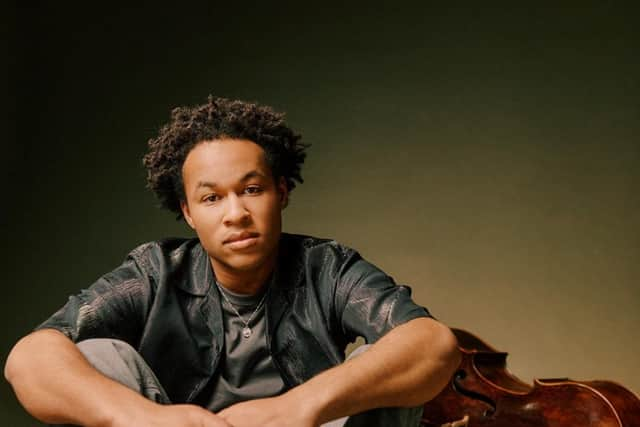Royal wedding cellist Sheku Kanneh-Mason plays Horsham date
and live on Freeview channel 276
Advance booking by phone 01403 252602; [email protected]; wegottickets.com/HorshamMusicCircle or on the door.
Highlights of Sheku’s 23-24 season include the Last Night of the Proms and extensive recital tours and performances with the world’s major orchestras. He famously played at Prince Harry’s wedding. Plínio is a Brazilian guitarist from São Paulo who takes his inspiration from a long line of greats, the guitar being central to the Brazilian folk tradition. For Horsham, they will be performing a programme of solos and duos from Bach, including the D minor Cello Suite, to Brouwer and Villa-Lobos.
Advertisement
Hide AdAdvertisement
Hide AdIt’s a great partnership on both sides. As Sheku says: “Most importantly you need somebody that has that love of music but you also need somebody who has that seriousness, and sometimes you think that seriousness can sound a bit negative but I just think that seriousness is really important. It's about taking care and about being aware and it's about working together and about enjoying the music in the same way and properly getting the balance.”


Plínio adds: “I admired his playing a lot but it was that personal connection that came first. He was very out there playing concerts but I knew his older siblings and it just seemed such a natural connection. The reason that we started playing together was just very informal but we discovered that we share the same values, the same love of music and the same commitment and he just expressed all that in the best way.” Inevitably there are times when you perform with a musician with whom you don't particularly click: “But to perform at the highest level it is absolutely vital to have that connection.”
Since coming to the UK in 2014, Plínio has been able to expand his repertoire significantly: “But I've always been a classical musician from the beginning. I didn't think I would stay this long. I thought it would last the six years of the study and then go back to Brazil but I've always loved the UK and London and its culture and after the first six years I just felt that this was the place to be. I came here because of the Royal Academy and its tradition and just the institution as a whole but also because of my love of my idols, Julian Bream and John Williams and David Russell.”
Sheku said: “There is a great freedom to playing with Plínio but there is also a great attention to detail that I'm inspired by, and playing with a guitarist is very special. It's a very different sound world to the cello and I have really enjoyed exploring that sound world and finding ways to make it work.” Plínio added: “It's the enjoyment that's the main thing but it started in such a casual way. It's not like someone arranged for us to perform together. We're just friends who started making music together and the combination of the guitar and the cello doesn't happen a lot. Obviously there are arrangements that you can play but we have started trying to create repertoire as well, commissioning pieces. You spend a lot of time playing arrangements which is great but to be playing new music together really feels like the way to go.”
Advertisement
Hide AdAdvertisement
Hide AdFor Sheku, winning the 2016 BBC Young Musician award was in many ways the start: “I was 17 years old, just going into the final year of school and at times it was a bit overwhelming. Playing at that professional level was new but a lot of things didn't change and what I was really grateful was for was the fact that it was still the same team of people around me in terms of my teachers.” And then of course there was the royal wedding: “It was certainly not something I was expecting or aiming for but it was great. It was helpful not to be thinking about the audience beyond the cameras. The numbers of people watching were beyond comprehension but it was helpful that I was playing repertoire that I was really comfortable with.”